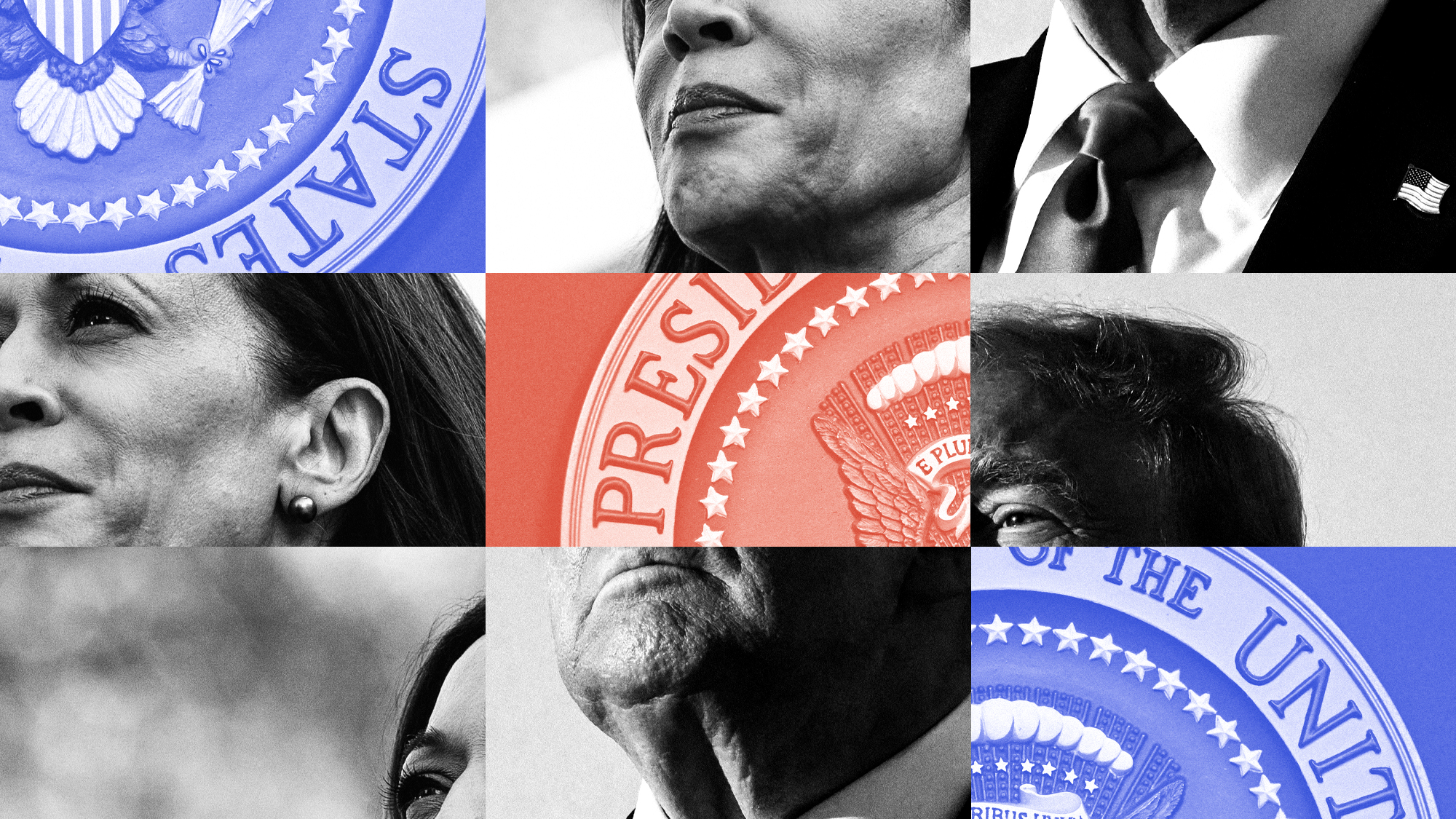Who will win the 2024 presidential election?
Election Day is here. Who are pollsters and experts predicting to win the White House?


A free daily email with the biggest news stories of the day – and the best features from TheWeek.com
You are now subscribed
Your newsletter sign-up was successful
America's next presidential election is finally here, which can only mean one thing: speculation about who will be the next person to occupy the White House is reaching a fever pitch.
A long race originally whittled down to two competitors: President Joe Biden and former President Donald Trump. However, Biden sent shockwaves throughout the United States when he announced on July 21 that he was suspending his campaign and endorsing his vice president, Kamala Harris, to be the Democratic nominee. Biden's withdrawal from the race made him the first sitting president not to seek reelection since 1968 and allowed Democratic politicians and campaign contributors to throw their support behind Harris, who locked up the required delegates to become the presumptive Democratic nominee just one day after Biden dropped out. She will face Trump in the general election after the former president officially became the GOP nominee at the Republican National Convention in mid-July.
With Election Day now upon us, and early voting having been going on for weeks already, pollsters and political scientists are working to calculate the fight over who will win the 270 electoral votes needed for a seat in the Oval Office. Who do the experts believe will be the next president of the United States?
The Week
Escape your echo chamber. Get the facts behind the news, plus analysis from multiple perspectives.

Sign up for The Week's Free Newsletters
From our morning news briefing to a weekly Good News Newsletter, get the best of The Week delivered directly to your inbox.
From our morning news briefing to a weekly Good News Newsletter, get the best of The Week delivered directly to your inbox.
Who do the polls say will win the election?
Donald Trump consistently led in the polls throughout his time facing off against Biden, who, despite a disastrous debate performance against Trump that led to calls for him to step aside as the Democratic candidate, insisted that he was staying in the race. However, the president "came grudgingly to accept that he could not sustain his campaign with poll numbers slipping, donors fleeing and party luminaries pushing him to exit," said NBC News. In the end, Biden's poll numbers made for a "no-win situation, a self-fulfilling prophecy," former White House official Cedric Richmond said to NBC.
But how do Harris' poll numbers against Trump compare to Biden's? Overall, much better, as she has been surging in most battleground polls since taking over the nomination, though the race remains tight. Harris is being assisted by polls showing that there is more enthusiasm among Democrats for her candidacy than Biden's, though there is similar enthusiasm among the MAGA base for Trump.
An Oct. 29 YouGov/Economist poll of 1,446 registered voters showed Harris leading Trump by one point; when the poll is whittled down to likely voters only, Harris' lead increases to two points. Other polls have Harris up by even larger margins, such as an Oct. 23 Big Village poll of 2,026 people that showed her beating Trump by five points; the same poll had Harris up by six points among registered voters. An Oct. 29 RABA Research poll of 781 people also had Harris up by four points. It seems more people also trust Harris' mental capacity over Trump's; a July 23 Reuters/Ipsos poll of 1,241 adults found that 56% of people thought Harris was "mentally sharp and able to deal with challenges," compared to only 49% who felt the same way about Trump.
However, while the polls are clearly boding better for Harris against Trump than Biden, the race remains a tight contest that could still go either way. There also many polls where Trump remains ahead, meaning a toss-up is still likely. An Oct. 31 AtlasIntel poll of 3,490 adults showed Trump leading Harris by one point; when the poll adds third party candidates to the mix, Trump's lead increases to two points. This is in line with an Oct. 31 TIPP Insights poll of 1,249 adults that also had Trump leading Harris by one point, and a Oct. 31 OnMessage poll of 800 adults that had Trump leading by two points (though this poll was a partisan survey sponsored by the GOP). The race in individual states remains even tighter, as three Marist polls released Nov. 1 had Harris up by three points in Michigan and two points in Wisconsin and Pennsylvania. However, FiveThirtyEight's Nov. 1 aggregate showed Trump leading Pennsylvania, perhaps the most critical swing state, by a 0.7-point margin, while Harris barely maintained a lead in Michigan and Wisconsin. The "four latest surveys from Pennsylvania indicate Trump holding a lead of 1 to 3 points among likely voters," said Newsweek.
A free daily email with the biggest news stories of the day – and the best features from TheWeek.com
Many of these polls indicate that the battleground state races could come down to the very wire; an Oct. 28 USA Today/Suffolk University poll had the two candidates dead even in Wisconsin. However, Harris has a 50% to 47% lead in Door County, Wisconsin, the state's most purple county and one that "60 Minutes" noted has "backed the winning presidential candidate for the last six elections."
Another microcosm of the race can be found in Nebraska, a state that "allocates its electoral votes by congressional district, rather than winner-take-all," said NPR. This means, in a scenario where Harris was one electoral vote short of the presidency, the vote of Omaha, Nebraska, could be crucial. The city is considered a blue dot in a red state, and "limited public polls show Harris with a firm lead here." However, if Trump were to win the majority of the swing states, a potential Omaha pick-up would be a moot point for Harris.
In FiveThirtyEight's most recent aggregation, which displayed 35 head-to-head polls with various parameters, Harris was beating the former president in 15, while Trump was beating Harris in 13, and the pair were tied in seven. But polls are only a snapshot, and this "doesn't mean Harris will run notably stronger than Biden, only that she could," said ABC.
Who do the pundits say will win the election?
Some pundits believed Trump, who gained even more notoriety among his base after surviving a pair of attempted assassinations earlier this year, would retake the White House against Biden. Others believed Biden would be able to win the election despite low approval ratings — and this mixed bag seems to be translating similarly now that Harris has entered the race. Harris' "elevation to the top of the ticket would bring new strengths for the Democrats, but it also exposes weaknesses that were less of a concern with Mr. Biden," Anthony Zurcher said at the BBC.
Harris' "record as vice president has been mixed. Early in the administration, she was set the task of addressing the root causes of the migration crisis at the U.S.-Mexico border," said Zurcher. A number of missteps on this front "damaged her standing and opened her to conservative attacks." Republicans are "already condemning her as the president's 'border czar,' attempting to make her the face of what public opinion polls have found is the Biden administration's unpopular immigration policies."
And perhaps the biggest unknown of all is whether the country will elect a woman to the presidency. Harris' "gender — and her potential to make history as the country's first female president — is defining the campaign, creating a contest that is, in ways overt and subtle, a referendum on the role of women in American life," said Lisa Lerer and Katie Glueck at The New York Times. While Harris is leading by large polling margins with women, some of them "can't shake the uneasy feeling that men in their lives are struggling to support a woman." There has never been a presidential race — even when Hillary Clinton ran in 2016 — where "gender is so central to the electoral prospects of each candidate," said Lerer and Glueck. There are also looming questions about the shift in minority voters, particularly Black men and Latinos, toward Trump, in a continuing move away from the Democratic Party support typically seen among these demographics.
Trump's history of racially charged comments has also been brought into question, and this reached a boiling point the week before the election when the former president held a massive rally in Madison Square Garden. The controversial event saw one of the president's warm-up acts deliver racist jokes about Puerto Ricans, and "evidence of the backlash was immediate" from Puerto Rican immigrants in swing states, said Politico. The speech from the rally was "prompting even the former president’s Republican allies to defend the island and denounce the comments," and "with the race essentially a toss-up, every vote counts — especially in Pennsylvania," said Politico, which noted that the Keystone State has a growing Puerto Rican population. However, some of the Democratic momentum from these remarks may have been undone after Biden appeared to call Trump supporters "garbage" the following day, leading to Trump participating in a campaign event in a garbage collector's outfit. Though Biden walked back his comments in a statement, Trump is "trying to milk" the remark for "everything it's worth — telling supporters it shows what Democrats really think about half the country," said Joey Garrison and Savannah Kuchar at USA Today. However, Trump has "made a long list of disparaging remarks himself, including labeling political opponents 'garbage' and 'scum,'" the pair noted, and has previously called the U.S. itself a "garbage can for the world."
Looking at the bigger electoral picture, there are also other factors that can be analyzed for the presidential race, such as the economy. The "performance of U.S. stocks has an uncanny track record of predicting the outcome of presidential elections," said John Power at Al Jazeera. Since 1928, the S&P 500 has pointed to the winner in 20 out of 24 elections, according to financial analysts. When stocks "were up during the three months before Election Day, the incumbent party kept the White House on 12 out of 15 occasions," said Power. The S&P 500 is up over 11 points since August, so the "historical trend clearly favors Harris." However, "caveats abound," as voters "do not appear to associate the stock market's strong performance with the economy doing well."
These factors notwithstanding, the "race is pretty tight, and it looks like it will remain that way until Election Day," said Nicole Narea at Vox. It is also notable that while Biden may not be the Democratic candidate anymore, this "doesn't mean he's irrelevant: Biden's approval rating is a proxy for how voters feel about his administration — one whose record Harris has for the most part defended." This "would be a negative verdict on the incumbent administration," Kyle Kondik, the managing editor of Sabato's Crystal Ball at the University of Virginia Center for Politics, said to Vox. Biden's low rating could prove problematic for Harris because "Republicans are gonna do their damage to connect all of the unpopular things with Biden to Harris," and it is "just the question of whether it works or not. I don't think it's worked yet," said Kondik.
Who else is in play?
There are other independent candidates who remain in the race, such as Cornel West and Jill Stein. But they are unlikely to prove a real challenge to either Trump or Harris. The most notable third-party candidate, Robert F. Kennedy Jr., suspended his campaign in August and endorsed Trump; pundits are mixed on whether this will provide a significant boost to Trump's campaign, especially given that most polls previously showed Trump would likely have more voters siphoned away as a result of Kennedy's candidacy than the Democratic candidate. However, questions remain as to how accurate any of the polls will be — and whether they will truly serve as a preview of Election Day.
Beyond third-party candidates, recent headlines have focused on the intrusion of billionaire money into politics — on both sides of the race. Controversy has notably swirled around Tesla founder Elon Musk, who has pledged to give $1 million a day to a random registered Pennsylvania voter who signs his pro-Trump PAC. Microsoft founder Bill Gates has also "recently donated about $50 million to a nonprofit organization that is supporting Vice President Kamala Harris' presidential run," according to The New York Times. Both financial injections have stirred controversy, and some have questioned the efficacy of these financial surges with so little time left until the election.
Justin Klawans has worked as a staff writer at The Week since 2022. He began his career covering local news before joining Newsweek as a breaking news reporter, where he wrote about politics, national and global affairs, business, crime, sports, film, television and other news. Justin has also freelanced for outlets including Collider and United Press International.
-
 What to watch out for at the Winter Olympics
What to watch out for at the Winter OlympicsThe Explainer Family dynasties, Ice agents and unlikely heroes are expected at the tournament
-
 Properties of the week: houses near spectacular coastal walks
Properties of the week: houses near spectacular coastal walksThe Week Recommends Featuring homes in Cornwall, Devon and Northumberland
-
 Will Beatrice and Eugenie be dragged into the Epstein scandal?
Will Beatrice and Eugenie be dragged into the Epstein scandal?Talking Point The latest slew of embarrassing emails from Fergie to the notorious sex offender have put her daughters in a deeply uncomfortable position
-
 Is the Gaza peace plan destined to fail?
Is the Gaza peace plan destined to fail?Today’s Big Question Since the ceasefire agreement in October, the situation in Gaza is still ‘precarious’, with the path to peace facing ‘many obstacles’
-
 Vietnam’s ‘balancing act’ with the US, China and Europe
Vietnam’s ‘balancing act’ with the US, China and EuropeIn the Spotlight Despite decades of ‘steadily improving relations’, Hanoi is still ‘deeply suspicious’ of the US as it tries to ‘diversify’ its options
-
 Trump demands $1B from Harvard, deepening feud
Trump demands $1B from Harvard, deepening feudSpeed Read Trump has continually gone after the university during his second term
-
 Trump’s Kennedy Center closure plan draws ire
Trump’s Kennedy Center closure plan draws ireSpeed Read Trump said he will close the center for two years for ‘renovations’
-
 Trump's ‘weaponization czar’ demoted at DOJ
Trump's ‘weaponization czar’ demoted at DOJSpeed Read Ed Martin lost his title as assistant attorney general
-
 Gabbard faces questions on vote raid, secret complaint
Gabbard faces questions on vote raid, secret complaintSpeed Read This comes as Trump has pushed Republicans to ‘take over’ voting
-
 Greenland: The lasting damage of Trump’s tantrum
Greenland: The lasting damage of Trump’s tantrumFeature His desire for Greenland has seemingly faded away
-
 The price of forgiveness
The price of forgivenessFeature Trump’s unprecedented use of pardons has turned clemency into a big business.
